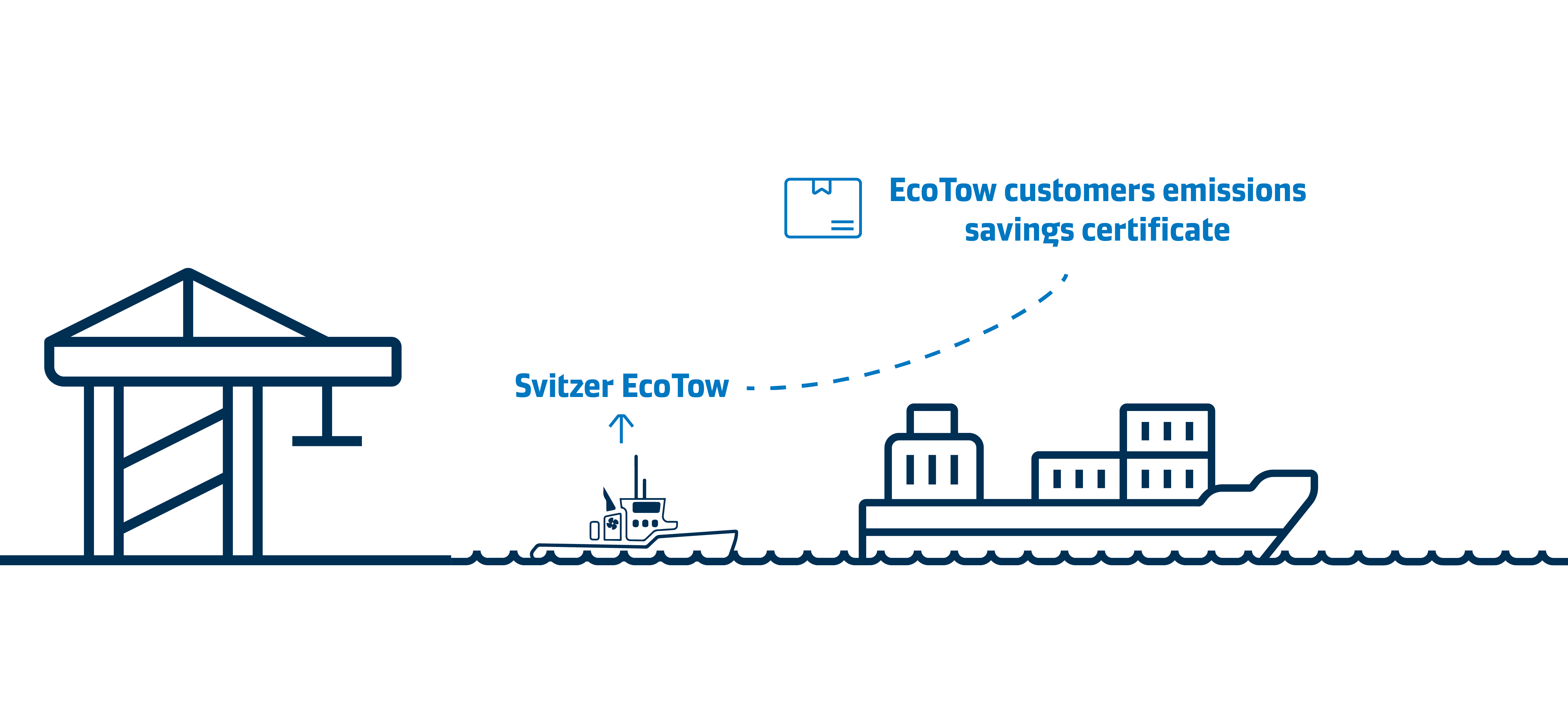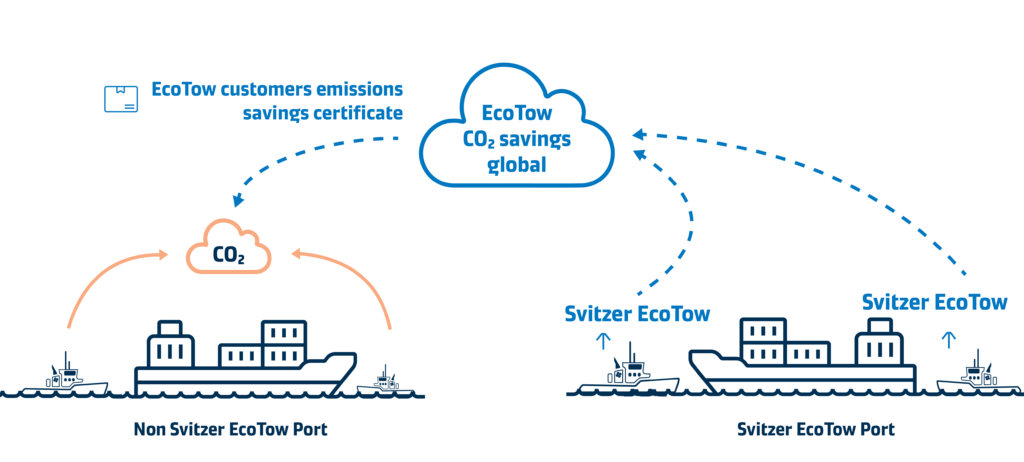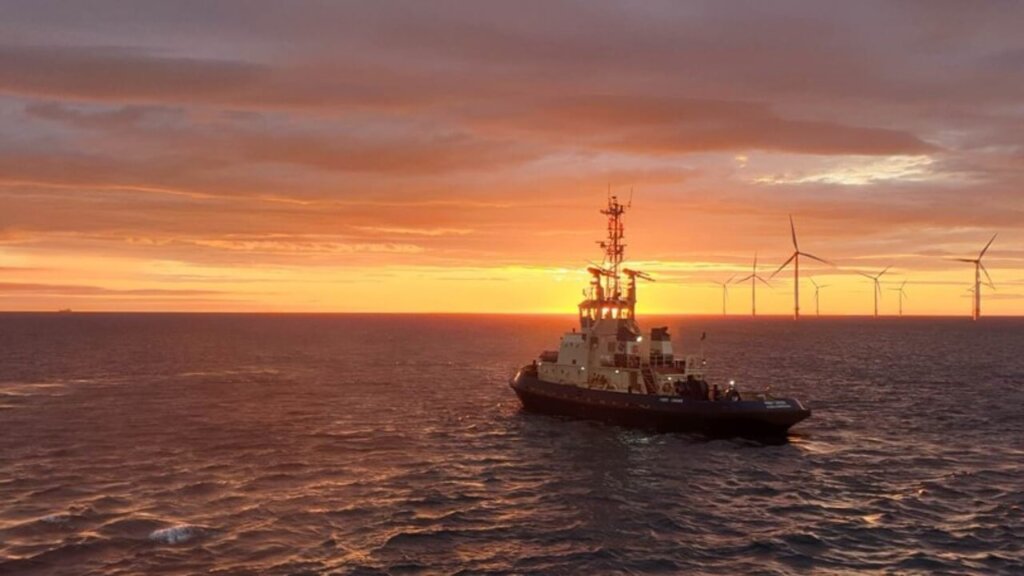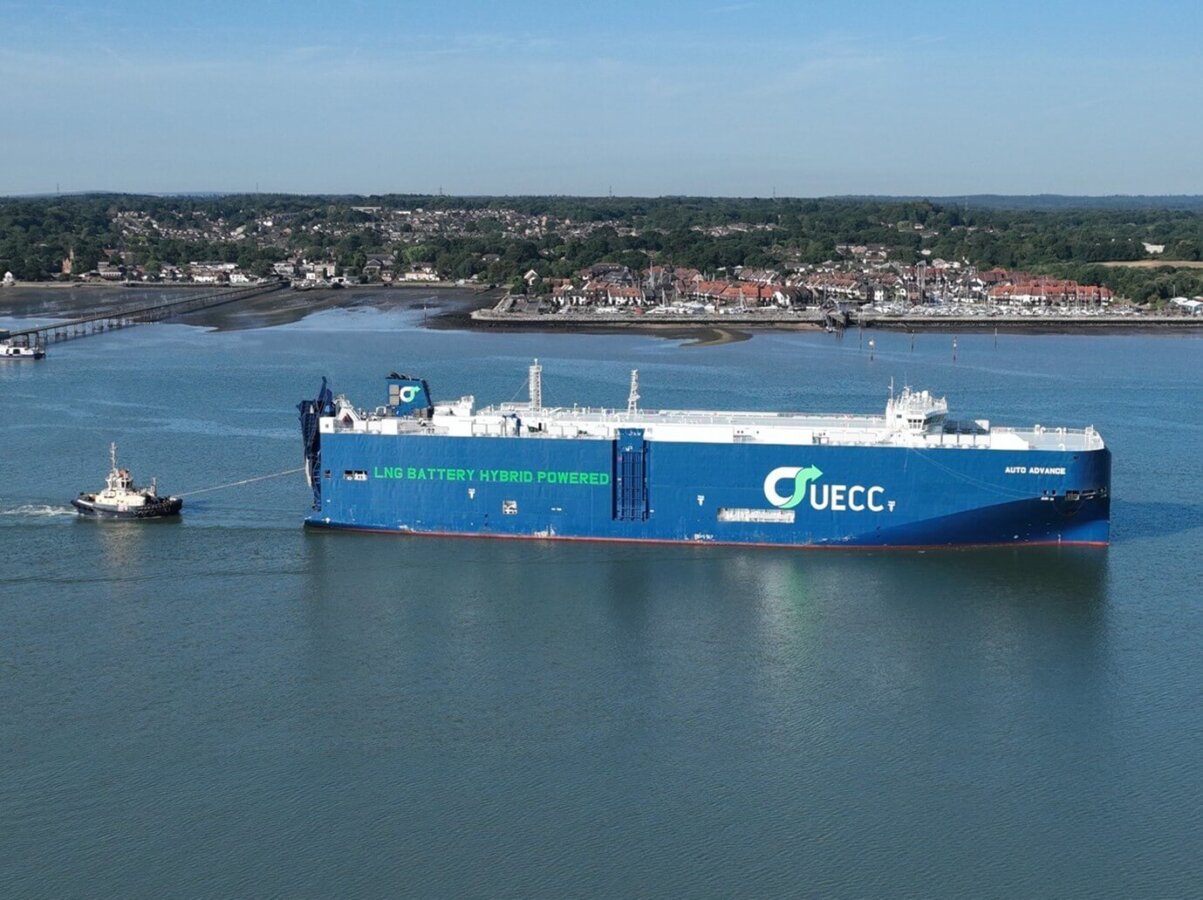DECARBONISE YOUR TOWAGE SERVICES WITH SVITZER ECOTOW
EcoTow is Svitzer’s immediate carbon insetting solution which helps to decarbonise your harbour towage through the replacement of marine gas oil (MGO) with various types of very low-carbon biofuels.
For you as a customer, EcoTow is easily added to your contract as a very low-carbon alternative to fossil fuel-based towage services. EcoTow provides you with audited and verified emission reductions and marginal abatement costs per ton of CO2 saved. These are easily embedded into your ESG reporting.
How does Svitzer EcoTow work?
EcoTow is available to Svitzer customers in all ports and offers immediate scope 3 CO2 emission reductions while providing an alternative to fossil fuels. The neutralisation effect is established by an external auditor and documented through certification and assurance reporting.
Depending on which ports you operate in as a customer of Svitzer, EcoTow is made available to you as two different solutions:
Regional CO2 reduction – segregated approach
In ports where Svitzer’s vessels operate on very low-carbon fuels, we offer EcoTow as a direct decarbonised towage service with associated certificates.


Global CO2 reduction – mass balance approach
In ports where Svitzer’s vessels do not operate on very low-carbon fuels, we offer EcoTow as an indirect insetting solution enabling customers to decarbonise their complete towage portfolio.
This is done by calculating the emissions impact of customers’ fossil fuel-based towage services while matching this with the volume of very low-carbon fuels delivered to one of Svitzer’s vessels operating on very low-carbon fuels.
Why choose Svitzer EcoTow?
Check out the infographic below which provides a series of examples of benefits offered to you by choosing EcoTow as a carbon insetting add-on to your present towage services.

Certified CO2 emission reductions
All Svitzer EcoTow emission reductions are documented through certification and assurance reporting in line with RSB (Roundtable for Sustainable Biomaterial) standards.
By choosing EcoTow, you can easily add trustworthy evidence to your sustainability efforts through our Svitzer EcoTow CO2 savings certificate. Each certificate includes the number of metric tonnes of CO2 you save per year, facts on the amount of very low-carbon fuels used, tug assists with associated emissions and detailed information on well-to-wake and tank-to-wake emissions.

Consistent reporting based on industry-leading standards
Svitzer EcoTow follows the approach of the International Sustainability and Carbon Certification (ISCC) and the Global Logistics Emission Council (GLEC) as organisations which drive the consistent calculation and reporting of logistics GHG (greenhouse gas) emissions. Their proven frameworks and methodologies provide you with certainty that your CO2 emission reductions through EcoTow are real.
International Sustainability and Carbon Certification (ISCC)
International Sustainability and Carbon Certification
ISCC is a certification system for all sustainable raw materials and markets, wherein the entire supply chain from raw material to end product is certified and traceable through proof of sustainability documentation.

External auditors
In order to provide trust and comfort around the Svitzer EcoTow emissions savings in the eyes of customers and other stakeholders interested in Svitzer sustainability agenda, 3rd party audit in accordance with International Standard on Assurance Engagements 3000 (Assurance Engagements other than Audits and Reviews of Historical Financial Information) which provides customers with assurance that:
- Svitzer EcoTow is audited each year by an external auditor to offer assurance that we maintain the highest standards. This not only increases transparency but ensures that Svitzer EcoTow is a credible product that our customers can trust.
- Svitzer EcoTow can document a mass balance for biomaterials for the reporting period that biomaterials have been procured and consumed on Svitzer vessels to an extent accounting for all decarbonised tug jobs that towards customers are claimed to be carbon neutral.
If you have any more queries feel free to browse through our FAQs
What sustainable fuels do Svitzer EcoTow use today?
Svitzer EcoTow is currently using Hydrotreated Vegetable Oil (HVO). Biofuel oil is produced using waste oils and fats from food production which is not fit for human or animal consumption. Biofuel is available at reasonable prices and in sufficient quantities, but in limited regions as of today. As market demand increases, so too will the industry supporting it thus improving the production and distribution of biofuel. Svitzer, via Maersk, is currently an active member in the Clean Cargo Working Group (CCWG) and we act as a licensed buyer, blender and user of biofuel. We are monitoring market developments closely to ensure that Svitzer EcoTow can reliably and consistently achieve the CO2 savings promised.
What are the future sustainable fuels that could be used tomorrow?
On climate change, Svitzer’s target is to have net-zero emissions from our towage activities by 2040.
In 2021 we reached several important milestones towards this ambitious target with the launch of Svitzer EcoTow and the order of methanol vessels.
We determined where most of our investments in new fuels will go in the next years, zooming in on potential fuel types based on alcohol (methanol) and Hydrotreated Vegetable Oil (HVO). For alcohol and biomethanol, the main advantage is the relatively simple transition from existing ship designs and infrastructure, whereas the main drawback is uncertainty about the availability of biomass feedstock as demand increases.
Furthermore, Svitzer is committed to achieving a 50% reduction in the carbon intensity of our fleet by 2030. The use of alternative fuels is key for us to achieve this ambition. HVO provides us with an immediate practical option to make progress toward that target but we are proactively pursuing other potential fuel options that may bring CO2 reduction benefits in the future. This will help us to secure the availability in the long term for EcoTow services.
I want to try Svitzer EcoTow, what do I do?
As a flexible product, you can choose Svitzer EcoTow in specific EcoTow ports (*Regional Segregated method), for part or the whole of your global towage volume (*Global mass balance method). To try this out, please contact your account manager to add Svitzer EcoTow to your harbour towage coverage.
